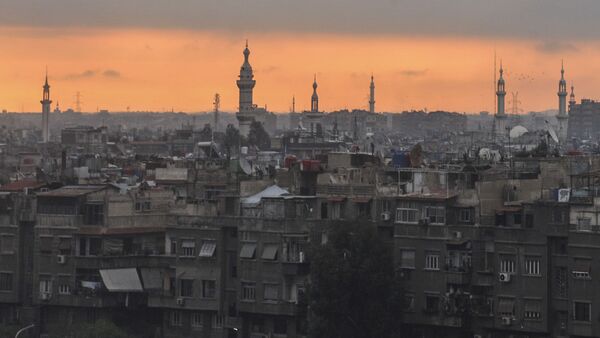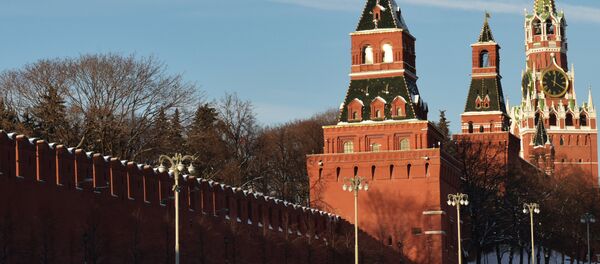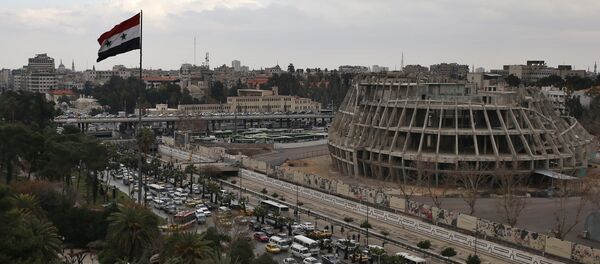Turkey is ready to serve as a guarantor of a ceasefire in Syria alongside Russia and hopes to see the nationwide truce by year-end, Turkish Foreign Minister Mevlut Cavusoglu said on Thursday.
His comments come after reports on Wednesday that Turkey and Russia have agreed on the outlines of a nationwide ceasefire plan in Syria to be presented to Damascus for consideration.
The framework agreement between Russia and Turkey on Syria proposed the end of hostilities in the country starting at midnight local time on December 29.
Should the pact hold, the Syrian government and opposition will launch peace talks in the Kazakh capital of Astana brokered by Russia and Turkey.
Radio Sputnik discussed the issue with Emre Erşen, Lecturer at Istanbul-based Marmara University’s Department of Political Science and International Relations, expert on Russia-Turkey relations.
"I think the agreement is very important considering that it is currently the only ceasefire plan on the table," he told Radio Sputnik.
"Turkey and Russia have been latterly working very closely on the ground in Syria and this agreement is actually the result of this process. However we should keep in mind that similar plans on Syria have failed in the past. Therefore we might need some time to see whether this new plan is successful in the long-term," he explained,
The political scientist then added that there are many different state and non-state actors operating in the Syrian conflict. And how they perceive this new process will be equally important.
Emre Erşen also commented on the similar agreement brokered between Russia and the US, which failed in its infancy, and suggested what might hamper the current nationwide ceasefire plan.
"We know that the US has provided military support to some of the groups in Syria but it has actually never wanted to be involved very actively in the Syrian conflict from the very beginning. Which, in time, has seriously weakened its hand at the diplomatic table," he explained.
The two countries also have different perceptions about the definitions of the terrorist groups in Syria: Turkey believes that the Kurdish YPG forces (The People's Protection Units) should also be defined as a terrorist organization. For Russia, the priority is fighting Daesh (ISIL/IS) and Jabhat Fateh al-Sham, formerly known as the al-Nusra Front.
The political scientist suggested that if a Russian attack on Idlib, which is currently a stronghold of the opposition groups that are supported by Turkey, takes place, this might also cause serious friction between Ankara and Moscow. All of these issues could become serious obstacles for the ceasefire agreement, at least in the short-term.
Erşen also commented on the recent trilateral meeting of Russia, Turkey and Iran in Moscow, explaining why, in his opinion, Tehran's inclusion in the process is so important.
"It is very significant that apart from Turkey and Russia, Iran is also included in this new process. These are the three countries whose military forces actually have some sway on the ground. We should also remember that this trilateral cooperation was very effective in solving the Aleppo crisis," he said.
The expert further explained that Russia and Iran have been acting together to solve the Syrian crisis from the very beginning. However the inclusion of Turkey is also very important because Turkey and Iran are the two major regional powers in the Middle East and the cooperation between them can produce important outcomes not only to the solution of the Syrian conflict but to other significant issues in the Middle East, such as Turkey's relations with Iraq and the Israeli-Palestinian dispute. Therefore it is a step in the right direction, with Russia monitoring this process.
For instance, he said, they have established an information center in Baghdad to coordinate their efforts in fighting terrorism. However Turkey's relations with the Baghdad government are certainly complicated due to the presence of Turkish soldiers at the Bashiqa camp near Mosul.
"Russia however may play a role in mending ties between Baghdad and Ankara," he suggested.
"Turkey has some concerns about the future of Mosul. And if the Baghdad government can reach an understanding with Ankara on this issue, this might also pave the way for a new trilateral rapprochement between Turkey, Iraq and Iran which would definitely be very significant for the change of the geopolitical balance in the Middle East," he explained.
Erşen also discussed what message the Russia-Turkey agreement is sending to the West.
"Currently we know that the US and UN are largely excluded from the new ceasefire process and I don't think that they are very happy about this. Especially considering that Turkey is a member of NATO," he explained.
"How the new US administration will perceive the situation in Syria and how it will react remains to be seen and is very important. If Trump decides to reach an understanding with Russia and Turkey over Syria than there is a chance that the US might become one of the major actors of the peace process in Syria again," he suggested.
While commenting on the real possibility of the talks between the Syrian government and the opposition, he suggested that they are most likely to take place otherwise Russia, Iran and Turkey would not have mentioned them in the Moscow declaration.
"Turkey is very influential on the opposition groups and Russia and Iran are very influential on the Assad government," he noted.
However we should keep in mind, he said, that similar initiatives have failed in the past, and so achieving a lasting peace in Syria will take time. The three countries are well aware of this. The initiation of this process in Astana is already an extremely important move because currently there is no better option, he finally stated.
Have you heard the news? Sign up to our Telegram channel and we'll keep you up to speed!





